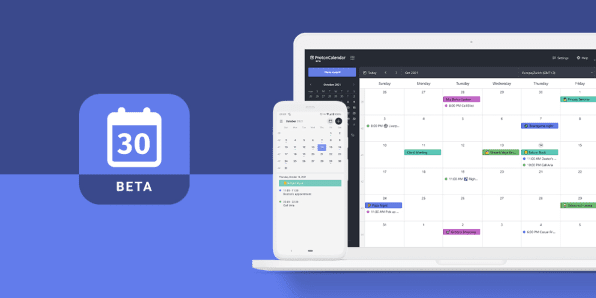
It's no secret that Google Workspace tools collect our data. But can other companies that care about our privacy offer similar tools? What will they demand from us in return? (spoiler alert: money, but it's not all about it) The
encrypted email service ProtonMail has been around since 2014, but recently the company has started targeting a wider segment. In April, Proton launched a public beta of its calendar. And earlier this month, I rolled out a beta version of a cloud storage called Proton Drive for all paid subscribers. A recent redesign has helped tie all of these products together into a single interface.
The company plans to develop products such as video chat. As they say, draw your own conclusions. And this is far from the only example.

Proton Calendar
“What Google does not always protect privacy,” says Proton CEO Andy Yen. "In the long run, I would like to implement everything that they do, but do it right, first of all respecting confidentiality."
Companies like Skiff, Vivaldi, Brave, and DuckDuckGo are also trying to implement a number of similar tools and persistently put privacy at the forefront. They are also working to improve technologies for protecting user data.
Such an aspiration is commendable, and the goals are indeed very noble. But these companies face one big problem: it is very difficult to compete with Google by playing fair. And from the point of view of human and material resources, forces, to put it mildly, are not equal.
Some people generally think that they are overly concerned about the protection of user data.
The privacy and ecosystem trend
Consider other examples of optimists who have entered this market segment and share the same values:
- Skiff (develops end-to-end encrypted online document editor) launched closed beta and raised $ 3.7 million in seed round in May . CEO and co-founder Andrew Milich says the startup is already prototyping tools like spreadsheets. (It looks like the company wants to implement support for the dynamic, interconnected documents popularized in Notion. Google is trying to do the same .)
- - Vivaldi , , RSS- . , , , Google. (, , Vivaldi).
- DuckDuckGo plans to launch its own desktop web browser later this year, according to Wired, in addition to its existing search engine and mobile browser. The company is also working on an anti-tracking app (for Android OS) and technology to block email tracking .
- The developers of the Brave browser, meanwhile, are making their own search engine.
All of these companies seem to have realized one thing: to truly compete with Google, they need to build an entire ecosystem, not just one unique service.

Skiff, dark theme
"The reason Google is so powerful and attractive to consumers is because they really offer a complete set of products," says Yen.
Many web services are now easier to create as more companies release products using encryption technologies and publicly share the technical details of their work. For example, to support end-to-end encryption in Skiff, the startup relied heavily on existing white papers and white papers from other encrypted services - Signal, 1Password, and even Proton.

Skiff, document blocking
What's more: end-to-end encrypted products can now run faster than before. Skiff, for example, uses a concept called the Conflict-Free Replicated Data Type, or CRDT , to encrypt documents . This allows documents to be encrypted even when several people are working with them in real time.
So, developers have more and more technical opportunities to create products with a higher level of privacy protection.
A question of (non-) trust
Some of the privacy concerns associated with services such as Gmail and Google Docs can be exaggerated. Google did collect the content of your emails for targeted ads, but dropped this practice in 2017. The company also promises not to data mining of your data from other applications - Google Drive and Google Photos. Users will be able to delete the data that the company collects at any time.
But more discerning privacy advocates say these promises are not enough. WhatsApp is a “perfect” example of how big tech companies can easily break a promise: its new privacy policy forces users to exchange metadata directly with Facebook. WhatsApp also allows brands to communicate with users in some countries without using encryption.

Vivaldi mail
“I don’t want to be harsh, but they are either introducing privacy policies that stab users in the back, or they set default security settings that are much lower than people expected,” says Skiff CEO Andrew Milich. "It makes me think that [these companies] don't really have a privacy future."

Vivaldi reader
In theory, they can provide a high level of privacy. But it will be very difficult if they don't start from scratch. Facebook, for example, announced back in 2019 that it was working on end-to-end encryption for Facebook Messenger, but admitted in April that it would not do so until 2022.
“Imagine that you have exabytes of user data, and now you need to make all this data confidential,” says Milic. "For an old product with a billion users, this is a huge technical challenge."
Reducing technology backlog
Most potential competitors are still far from the level of products like Google Docs or Google Drive. And in some cases, the aversion to collecting user data even puts them at a disadvantage.
For example, in the web version of ProtonMail, users cannot search the email body because the data is encrypted. Only subject text, which is not encrypted, is searchable. Proton allows you to perform a full search only for downloaded emails or through a mobile application. Or through a special "Bridge"that connects to desktop email clients - Microsoft Outlook or Apple Mail. But even with these tweaks, Proton can't offer the level of analytics that Gmail offers. For example, he has no way of recognizing the flight confirmation email and adding that flight to his calendar.

ProtonMail
Ian believes that this lag will narrow as the devices become more powerful. This will allow them to process more data offline:
“The advantage of faster phones and devices today is that you can do more complex calculations on the device side. This allows all of these functions to be implemented while maintaining confidentiality. "
He notes that the ability to add appointments to the calendar based on email content will appear later this year.
Vivaldi has similar issues with its email client. This service has the ability to sort emails from mailing lists into folders. But its accuracy is much lower than that of Google's "Categories", which can automatically hide, for example, notifications from social networks or sales letters.
However, CEO von Techner says Vivaldi doesn't care about making everyone happy. The company does not collect data on how people use the product:
“When you collect information about how people use software, you cannot make an adequate decision. Because [you get] the average, and then [you have to] optimize the software for that average, ”he says. "The average is not the [average] person."
Nothing personal just business
There is also a problem with the choice of business models. Both Skiff's Milich and Proton's Ian opted for freemium. But their free versions will likely never match what Google offers for free. ProtonMail only provides 500MB of storage space on its free plan. Skiff may also have storage limits. Even paid Proton subscribers only get 5GB of storage. This is less than you can get from Google without paying a dime.
“The business model that we adhere to will never be as profitable and profitable as the model of invading users' privacy and [trading] their data,” says Yen. "But that doesn't mean [our business model] won't be profitable."
Both entrepreneurs believe that users are more and more willing to pay for their privacy.
A virtual VPS server with fast NVM disks and daily payment is available at Macleod.
